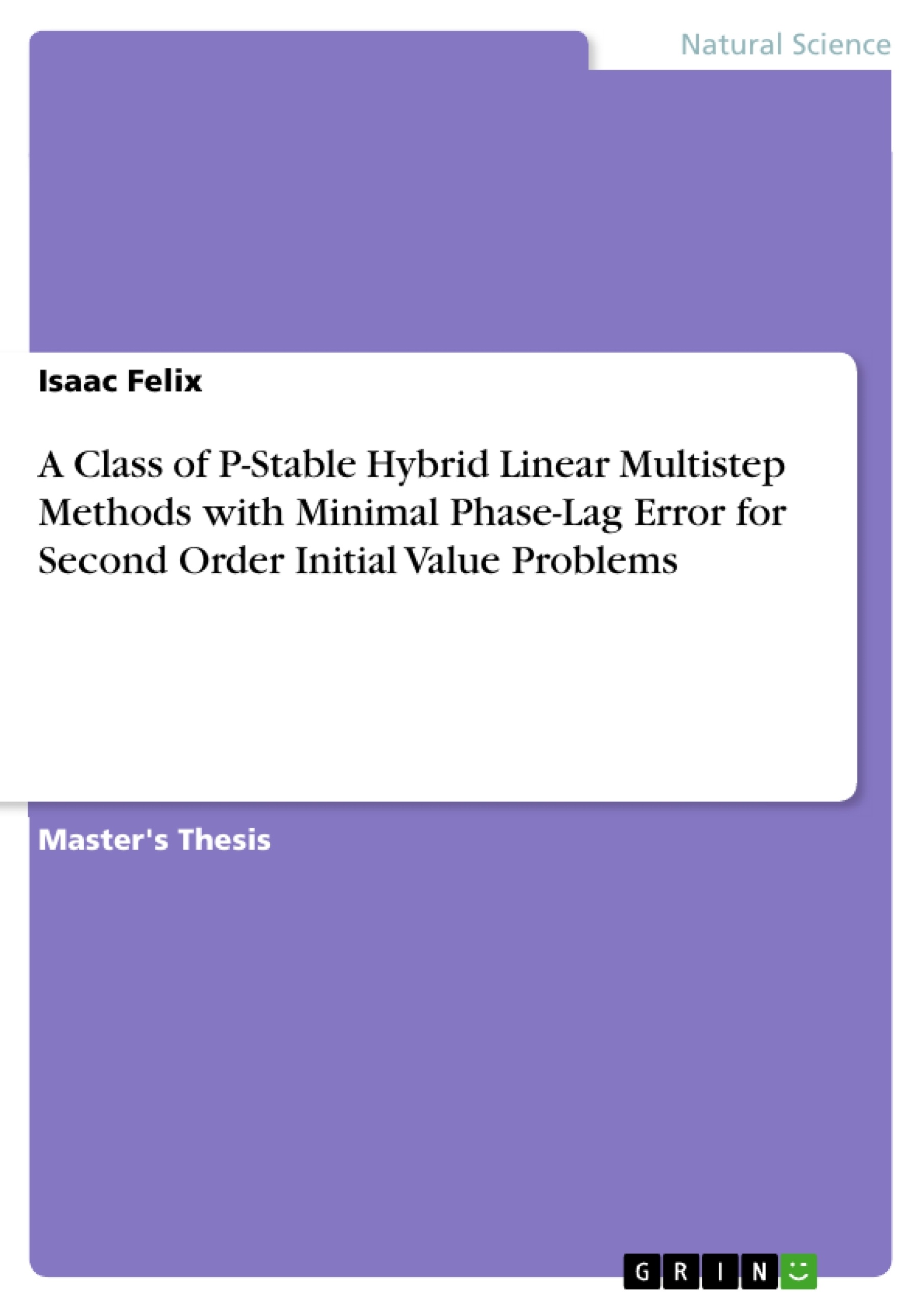P-stable hybrid linear multistep methods (HLMMs) have been an interesting focus for the numerical solution of second order initial value problems (IVPs) in ordinary di_erential equations (ODEs), because of their high order of accuracy. In this thesis, we present a new class of P-stable HLMMs with order p = 2 and p = 4 respectively for the numerical solution of second order systems. The hybrid schemes which are obtained via Pade 0 approximation approach have minimum Phase-lag error. Numerical experiments are carried out to show the accuracy of the proposed schemes. Nevertheless, the desire in this work is on high order P-stable schemes (p > 4). We give a proposition with proof, stating the limitation of the approach in search for higher order P-stable formulas. Key words: P-stability, Phase-lag error (PLE) constant, Hybrids, order, Interval of periodicity, Pade 0 approximation, Principal local truncation error (PLTE).
Inhaltsverzeichnis (Table of Contents)
- INTRODUCTION
- Overview
- Statement of the Problem
- Justification of the Study
- Motivation of the Study
- Aim and Objectives of the Mathematical Research
- Methodology
- Significance of the Study
- Scope of the Thesis
- PRELIMINARIES
- Introduction
- Linear Multi Step Methods (LMMs)
- Hybrid Linear Multistep Method
- Super-Implicit Hybrid Linear Multistep Method
- Existence and Uniqueness Theorem
- Basic Definitions
- Stability Analysis
- Pade Approximation
- Phase-Lag Analysis
- LITERATURE REVIEW
- Introduction
- The Fourth Order P-stable Method of Hairer (1979)
- The Hybrid Schemes of Fatunla (1983-1995)
- The Hybrid Linear Multistep Formulas of Fatunla et al (2007)
- PROPOSED P-STABLE HYBRID LINEAR MULTISTEP METHODS AND THEIR NUMERICAL IMPLEMENTATION
- Development of the Proposed P-stable Formulas
- Phase-lag and Stability Analysis of the new Schemes
- Numerical Implementation and Experiments
- Implementation Issues
- Discussion of Numerical Results
- SUMMARY
- Conclusion
- Findings
- Contribution to Knowledge
- Future Work
Zielsetzung und Themenschwerpunkte (Objectives and Key Themes)
This thesis aims to develop a new class of P-stable Hybrid Linear Multistep Methods (HLMMs) for the numerical solution of second order initial value problems (IVPs) in ordinary differential equations (ODEs). The primary goal is to create highly accurate and efficient numerical schemes that can effectively handle periodic stiffness, a common challenge in solving these types of problems.
- P-stability and its application in solving oscillatory initial value problems
- Development of P-stable HLMMs with high order of accuracy
- Phase-lag error analysis and its minimization
- Numerical implementation and analysis of the proposed schemes
- Limitations and challenges of the Pade approximation approach for higher order P-stable methods
Zusammenfassung der Kapitel (Chapter Summaries)
- Introduction: This chapter provides an overview of numerical methods for solving second order IVPs, highlighting the challenges posed by periodic stiffness. The need for efficient and accurate numerical solutions for these problems is emphasized, along with the significance of P-stable methods in this context.
- Preliminaries: This chapter reviews fundamental concepts related to linear multistep methods (LMMs), hybrid methods, and their stability properties. It introduces Pade approximation and phase-lag analysis, essential tools for the development and analysis of numerical schemes.
- Literature Review: This chapter explores existing research on P-stable methods, focusing on the work of Hairer, Fatunla, and others. It discusses the limitations of previous approaches and the motivation for developing new P-stable HLMMs.
- Proposed P-stable Hybrid Linear Multistep Methods and their Numerical Implementation: This chapter presents the proposed P-stable HLMMs, outlining their derivation and analysis. It includes details on phase-lag error estimation, stability analysis, and numerical implementation procedures.
Schlüsselwörter (Keywords)
This thesis focuses on P-stability, Phase-lag error (PLE) constant, Hybrids, order, Interval of periodicity, Pade' approximation, and Principal local truncation error (PLTE). These keywords represent key concepts related to the development, analysis, and numerical implementation of P-stable HLMMs for solving second order initial value problems with periodic stiffness. The study contributes to the ongoing research on efficient and accurate numerical methods for solving these challenging problems.
Frequently Asked Questions
What are P-stable hybrid linear multistep methods (HLMMs)?
P-stable HLMMs are advanced numerical schemes designed to solve second-order initial value problems (IVPs) in ordinary differential equations, particularly those with oscillatory or periodic solutions, offering high accuracy and stability.
What is the primary objective of this thesis?
The goal is to develop a new class of P-stable HLMMs with minimal phase-lag errors for solving second-order systems efficiently, specifically addressing challenges like periodic stiffness.
What orders of accuracy are achieved by the proposed schemes?
The thesis presents new schemes with orders p = 2 and p = 4, while also investigating the limitations of searching for even higher-order P-stable formulas (p > 4).
How is the Pade approximation used in this research?
The hybrid schemes are obtained via the Pade 0 approximation approach to ensure they have the minimum possible phase-lag error constant.
What is phase-lag error in numerical methods?
Phase-lag error refers to the difference in the phase of the numerical solution compared to the exact solution over time. Minimizing this is crucial for accurate results in oscillatory problems.
Which previous works are reviewed in the literature section?
The thesis reviews established methods such as the fourth-order P-stable method by Hairer (1979) and various hybrid schemes developed by Fatunla between 1983 and 2007.
- Arbeit zitieren
- Isaac Felix (Autor:in), 2018, A Class of P-Stable Hybrid Linear Multistep Methods with Minimal Phase-Lag Error for Second Order Initial Value Problems, München, GRIN Verlag, https://www.grin.com/document/442178



